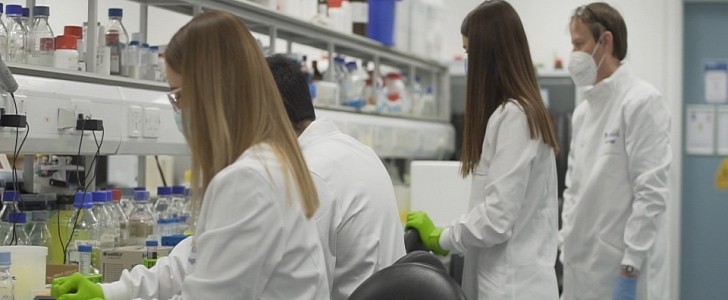MicroAge is the second experiment funded by the UK Space Agency that will fly to the International Space Station (ISS) after the previous one was launched in June. Described as “one of the greatest challenges of the 21st century,” ageing will be at the center of this innovative study that required three years of preparation.
We’ve heard of all types of creatures, such as worms and tardigrades, being flown this year to space, to help advance human health, but this time it’s all about cells. Human muscle cells as big as rice grains will be placed into 3D-printed containers the size of pencil sharpeners and launched on board a SpaceX Falcon 9 rocket taking off today, at 10 a.m. (GMT), from the Kennedy Space Center in Florida.
In the absence of gravity, astronauts’ muscles are weakened, as if they were growing old. This is why, by studying the changes that muscle tissue goes through in space, scientists can better understand the process of ageing and how to prevent it. On the ISS, the “flying” muscle cells will be electrically stimulated to mimic contractions, while researchers analyze them. This experiment could have a significant impact on preventing health conditions such as musculoskeletal disease.
It took three years to develop the scientific hardware required for taking the muscle cells to space. Normally, the electronic equipment alone would “fill a large desk,” as Professor Malcolm Jackson from the University of Liverpool explained, but it was downsized to something that’s no bigger than a pack of cards. In fact, these types of automated and miniaturized systems are essential for most types of scientific experiments carried out in space.
The MicroAge experiment will be completed by January 2022, when it’s due to return to Earth. The mission patch was designed by a nine-year-old, the winner of a competition launched by the University of Liverpool, which got kids involved in this exciting space experiment.
The next scientific study funded by the UK Space Agency will fly to the ISS in October 2022, with the goal of studying complex fluids in microgravity. It’s an exciting time for scientific research in space, particularly for the UK, which has been working hard for a spectacular relaunch of its space sector.
In the absence of gravity, astronauts’ muscles are weakened, as if they were growing old. This is why, by studying the changes that muscle tissue goes through in space, scientists can better understand the process of ageing and how to prevent it. On the ISS, the “flying” muscle cells will be electrically stimulated to mimic contractions, while researchers analyze them. This experiment could have a significant impact on preventing health conditions such as musculoskeletal disease.
It took three years to develop the scientific hardware required for taking the muscle cells to space. Normally, the electronic equipment alone would “fill a large desk,” as Professor Malcolm Jackson from the University of Liverpool explained, but it was downsized to something that’s no bigger than a pack of cards. In fact, these types of automated and miniaturized systems are essential for most types of scientific experiments carried out in space.
The MicroAge experiment will be completed by January 2022, when it’s due to return to Earth. The mission patch was designed by a nine-year-old, the winner of a competition launched by the University of Liverpool, which got kids involved in this exciting space experiment.
The next scientific study funded by the UK Space Agency will fly to the ISS in October 2022, with the goal of studying complex fluids in microgravity. It’s an exciting time for scientific research in space, particularly for the UK, which has been working hard for a spectacular relaunch of its space sector.






